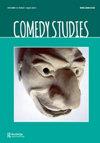Gender, ethnic and class as humour strategies in stand-up comedy of Bovi, Kenny Blaq, Akpororo and Basket Mouth
Q1 Arts and Humanities
引用次数: 0
Abstract
Abstract Humour in Nigerian stand-up comedy is used as a weapon against the strong and the weak in society. Existing studies have examined the use of humour using the theories of pragmatics but have not specifically examined how gender, ethnic and class are reflected in stand-up comedies. Therefore, this study examines the humour strategies in selected Nigerian stand-up comedies with a view to identifying how gender, ethnic and class are reflected in the comedies. Attardo and Raskin’s general theory of verbal humour was adopted as framework. The data for the study were purposively collected from stand-up comedy performances of Bovi, Akpororo, Basket Mouth and Kenny Blaq on the YouTube channel. The comedians reflect gender, class and ethnic while narrating the events that surround the participants in the joke. These comedians primarily used Nigerian Pidgin in narrating the activity-in-the-joke. In the data collected for the study, the selected Nigerian stand-up comedians (SNSCs) operated on two main contexts: context-of-the-joke and context-in-the-joke. The SNSCs adopted different humour strategies such as comparison, distortion of shared knowledge, projection of collective belief and denigration. The SNSCs employ the strategies in their performances to expose certain facts about the issues surrounding man in the society, point out ills and to show their creativity.性别、种族和阶级在Bovi、Kenny Blaq、Akpororo和Basket Mouth的单口喜剧中的幽默策略
摘要尼日利亚单口相声中的幽默被用作对抗社会强者和弱者的武器。现有的研究使用语用学理论对幽默的使用进行了研究,但没有具体研究单口喜剧中性别、种族和阶级是如何反映的。因此,本研究考察了尼日利亚单口喜剧中的幽默策略,以确定性别、种族和阶级在喜剧中的反映方式。本文以阿塔多和拉斯金的言语幽默理论为框架。这项研究的数据是从YouTube频道上Bovi、Akpororo、Basket Mouth和Kenny Blaq的单口喜剧表演中收集的。喜剧演员在讲述笑话参与者周围的事件时,反映了性别、阶级和种族。这些喜剧演员主要使用尼日利亚洋泾浜来叙述笑话中的活动。在为这项研究收集的数据中,选定的尼日利亚单口相声演员(SNSC)在两个主要背景下进行操作:笑话的背景和笑话中的背景。SNSC采用了不同的幽默策略,如比较、歪曲共同知识、投射集体信仰和诋毁。SNSC在表演中使用策略来揭露社会中围绕人类问题的某些事实,指出弊病,并展示他们的创造力。
本文章由计算机程序翻译,如有差异,请以英文原文为准。
求助全文
约1分钟内获得全文
求助全文
来源期刊

Comedy Studies
Arts and Humanities-Literature and Literary Theory
CiteScore
0.60
自引率
0.00%
发文量
26
 求助内容:
求助内容: 应助结果提醒方式:
应助结果提醒方式:


